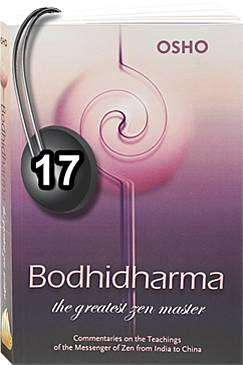Enlightenment: Sudden or Gradual
Individual Talk
From:Bodhidharma
In stock
"Bodhidharma is now really facing a question for which he has no answer. The case was the same in last night's sutra and it continues because the disciples are asking more and more about the..."
"Bodhidharma is now really facing a question for which he has no answer. The case was the same in last night's sutra and it continues because the disciples are asking more and more about the..."
Osho continues:
"When the questions are trivial the master is perfectly at ease to answer, but as the disciples become more and more keen in their inquiry and they start touching the ultimate, the master comes to a difficult situation. So as not to let the disciples feel that the master does not know, he goes on answering – but those answers are not true answers. They are in themselves perfectly right for some other questions, but not for the questions that have been posed before him.
"The question is very important. But even the greatest masters like Bodhidharma belong to a particular line of philosophy, a particular set of doctrines; hence they have to keep on repeating the ideological system they have accepted.
"It is totally different with me. I don't belong to any ideology. I don't have to console anybody. I am not concerned with who gets annoyed and irritated. My sole concern is that when you ask a question, you need a sincere answer – not according to ideology but according to my own experience.
"The disciple asks:
"The Buddha has certainly said: 'Only after undergoing innumerable hardships for three asankhya kalpas did I achieve enlightenment.' But as far as I can see, this is not a true statement of Gautam Buddha himself. It is what the Mahayana school of Buddhism maintains is the answer. Now Buddha is not there to refute it, and everything that he has said has been written after his death. And it has been written by common consent: a great gathering was called of all the old disciples who had been listening to him from the very beginning, and they assembled what everybody remembered."
"The question is very important. But even the greatest masters like Bodhidharma belong to a particular line of philosophy, a particular set of doctrines; hence they have to keep on repeating the ideological system they have accepted.
"It is totally different with me. I don't belong to any ideology. I don't have to console anybody. I am not concerned with who gets annoyed and irritated. My sole concern is that when you ask a question, you need a sincere answer – not according to ideology but according to my own experience.
"The disciple asks:
But the Buddha said, 'Only after undergoing innumerable hardships for three asankhya kalpas did I achieve enlightenment.' Why do you now say that simply beholding the mind and overcoming the three poisons is liberation?"The truth is a little complicated. First I will explain my position, if I were to answer the question. Then it will be easier for you to understand the difference, when a person answers because of a certain ideological school that he belongs to, and when a person answers just out of his own experience and response.
"The Buddha has certainly said: 'Only after undergoing innumerable hardships for three asankhya kalpas did I achieve enlightenment.' But as far as I can see, this is not a true statement of Gautam Buddha himself. It is what the Mahayana school of Buddhism maintains is the answer. Now Buddha is not there to refute it, and everything that he has said has been written after his death. And it has been written by common consent: a great gathering was called of all the old disciples who had been listening to him from the very beginning, and they assembled what everybody remembered."
| Publisher | Osho International |
|---|---|
| Duration of Talk | 129 mins |
| File Size | 30.51 MB |
| Type | Individual Talks |
| Edition/ Version | 2 |



The information below is required for social login
Sign In or Create Account
Create New Account